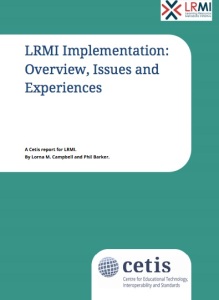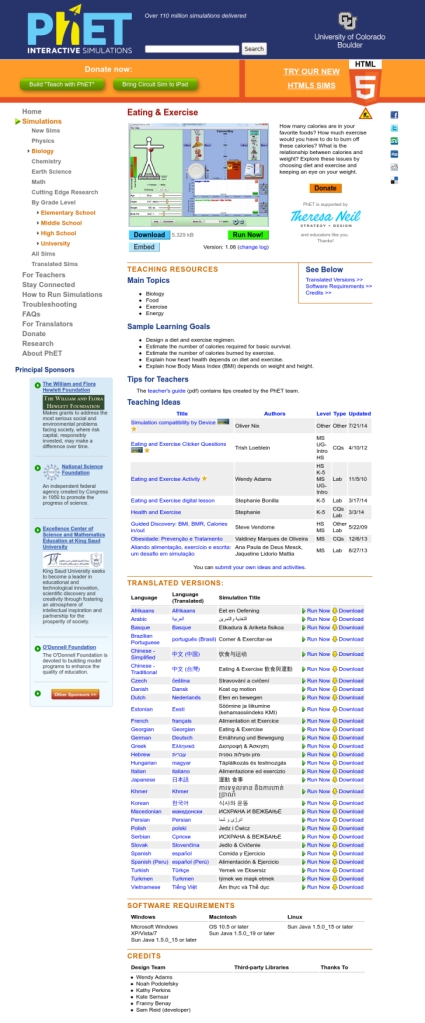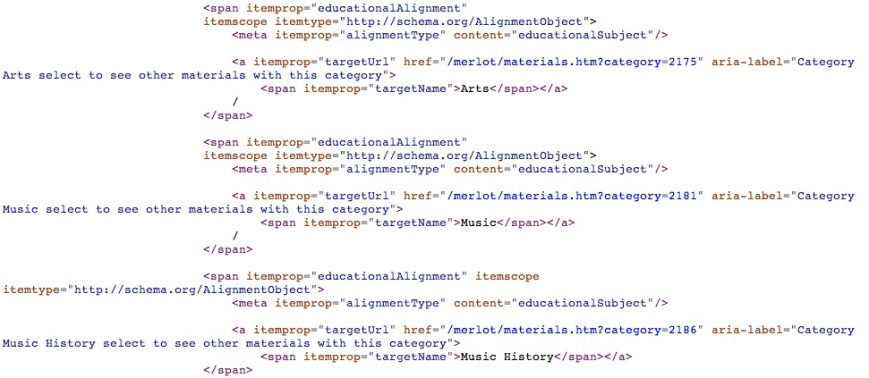T owards the end of last week Phil Barker and I completed and published our technical synthesis of the ten Learning Resource Metadata Initiative (LRMI) implementation projects funded through Creative Commons by the Bill and Melinda Gates and William and Flora Hewlett Foundations during phase two of the LRMI project. As part of our work on LRMI for Creative Commons we have produced cases studies on each project and undertaken a synthesis of their experiences and outputs.
owards the end of last week Phil Barker and I completed and published our technical synthesis of the ten Learning Resource Metadata Initiative (LRMI) implementation projects funded through Creative Commons by the Bill and Melinda Gates and William and Flora Hewlett Foundations during phase two of the LRMI project. As part of our work on LRMI for Creative Commons we have produced cases studies on each project and undertaken a synthesis of their experiences and outputs.
Category Archives: metadata
Learning Resource Metadata Initiative Webinar
Later this week my colleague Phil Barker and I will be giving a webinar on the Learning Resource Metadata Initiative (LRMI) as part of the ASIS&T DCMI webinar series. The webinar takes place on Wednesday 19th at 15.00 UTC and you can register here. Registration costs $25 and a recording of the webinar will be made freely available after the event.
On LRMI moving to Dublin Core
LRMI Implementation Case Study: ISKME OER Commons
ISKME’s OER Commons offers a comprehensive infrastructure and suite of services for educators globally, including groups of curriculum specialists, administrators, content providers, teachers, librarians, and technology and resource decision-makers who seek to implement high quality and adaptable curriculum through the use, evaluation, and improvement of open educational resources (OER).
Launched in 2007, OER Commons serves as a digital library and collaboration platform for content providers and emerging open education practitioners at all levels. Engaging with over 500 OER content providers from around the world, ISKME provides the open scaffolding necessary for knowledge sharing and access to teaching and learning materials, strategies, and curricula online. The site has over 35,000 registered users, 55,000 resources, and millions of visitors from 193 countries.
LRMI Implementation Case Study: OpenStax CNX
Project lead: Daniel Williamson, CNX
“OpenStax believes that everyone has something to learn, and everyone has something to teach. OpenStax CNX is a dynamic non-profit digital ecosystem serving millions of users per month in the delivery of educational content to improve learning outcomes. There are tens of thousands of learning objects, called pages, that are organized into thousands of textbook-style books in a host of disciplines, all easily accessible online and downloadable to almost any device, anywhere, anytime.”
LRMI Implementation Cases Study: Untrikiwiki
“The purpose of this project was to allow MediaWiki-based Open Educational Resource (OER) communities to adopt LRMI. This was done in two ways. Firstly, we built the technical infrastructure necessary for MediaWiki-based OER communities to implement LRMI. Secondly, we approached MediaWiki-based OER communities in attempt to convince them to use LRMI.”
LRMI Implementation Case Study: Curriki
Project team – Joshua Marks, Chief Technology Advisor, Robert Greenawalt, Chief Technology Officer, Paul Libbrecht, Developer.
“Curriki provides peer reviewed open educational resources, curricula and instructional materials to support teachers, professional educators, students, lifelong learners, and parents, primarily in the domain of K-12 education. Curriki is a nonprofit organization and the majority of the resources it provides carry Creative Commons licenses.”
LRMI Implementation Case Study: P2PU
“P2PU is a grassroots open education project that organizes learning outside of institutional walls and gives learners recognition for their achievements. P2PU creates a model for lifelong learning alongside traditional formal higher education. Leveraging the internet and educational materials openly available online, P2PU enables high-quality low-cost education opportunities. Learning for the people, by the people. About almost anything.”
LRMI Implementation Case Study: PhET Interactive Simulations
Project Team – Kathy Perkins, Director and Jonathan B Olson, Software Engineer
“PhET provides fun, interactive, research-based simulations of physical phenomena for free. We believe that our research-based approach- incorporating findings from prior research and our own testing- enables students to make connections between real-life phenomena and the underlying science, deepening their understanding and appreciation of the physical world.”
The PhET LRMI implementation project ran from July 2012 – July 2013. PhET currently has 128 simulations which are used over 45 million times per year. Since the site has 36 current website translations, unique metadata is provided on 4608 pages (each translated page has LRMI metadata in that language). The simulations are aimed primarily at K-12 and college use, but are designed to be compatible with any type of education. All simulations are licensed under the GPL, and most are also licensed CC BY.
LRMI is integrated into PhET metadata, so it is detectable by third parties that crawl or search the website. The site also provides Dublin Core, NSDL Dublin Core, IEEE LOM, IMS LODE ILOX, and a custom super-set of this metadata available via OAI-PMH and a REST API. Additionally, various custom exports have been created, usually CSV-based and customized to a particular portal. Metadata is stored in the PhET website’s main database and metadata for third-parties is automatically generated from the database, on demand, in a variety of formats. Since metadata is provided only for simulations, PhET does not store many of the LRMI properties internally in the DB since they are the same for every simulation. However the mapping includes translations (viewing a page on the Korean translation of the website will include Korean terms in the metadata).
PhET has implented the following LRMI properties and types:
- educationalAlignment: yes, includes multiple standards alignments
- educationalUse: yes, “classroom”, “homework” and “solution” for simulations
- interactivityType: yes, “active”
- learningResourceType: yes, “simulation”
- useRightsUrl: yes, can include multiple URLs (many simulations are dual-licensed)
PhET has not implemented:
- timeRequired: no (for inquiry-based simulations, there is no “standard” time required)
- typicalAgeRange: not yet, had previous uncertainty about format
- isBasedonUrl: no, simulations are original works
Currently “educationalAlignment” aligns to the Math Common Core, but the project team is currently working with teachers to create an NGSS alignment, which can be added.
PhET also implements the Schema.org “SoftwareApplication” type which enables them to provide available language information, denote PhET as the publishing and authoring organization, provide thumbnail and screenshot image URLs, denote it as applicationCategory:Educational, provide the “run now” and “download” URLs (url and downloadUrl), the download filesize, version/softwareVersion, description (in the language provided), a list of keywords, and dates created / modified.
During the funded phase of their LRMI implementation project, PhET initially shared their metadata with the Learning Registry, but as the Learning Registry has changed their protocols so frequently the project team has not been able to keep up with their change requests. PhET is currently not listed as Learning Registry contributors, but the team hopes that they will be able start sharing their metadata again once the protocols have settled down.
PhET has no current plans to develop their LRMI implementation further, unless there is additional demand from other organizations. The project team is unsure of how to measure the direct benefits of LRMI implementation but they are pleased that their simulations include LRMI metadata. Other third-party projects have also been pleased that PhET make LRMI metadata available and have pulled that data into their own applications.
LRMI Implementation Case Study: MERLOT
Team leader: Barbra Beid Sperling
“MERLOT is a free and open peer reviewed collection of online teaching and learning materials and faculty-developed services contributed and used by an international education community. The MERLOT collection consists of tens of thousands of discipline-specific learning materials, learning exercises, and Content Builder web pages, together with associated comments, and personal collections, all intended to enhance the teaching and learning experience.”
MERLOT is a metadata repository containing records for 46,000 open educational resources covering a wide range of subjects and all levels of education. Users are able to comment on and aggregate resources to create personal collections. MERLOT resources are peer reviewed by members and each resource record includes a “Quality Box”, which presents information on peer reviews, user ratings, comments and collections the resource has been added to.
MERLOT also provides access to a wide range of additional facilities including APIs to integrate with learning management systems and other applications, mobile search apps for iOS, Android and Blackberry, a content builder for creating hosted online learning materials and various community building tools such as discipline communities, community discussions, and social networking facilities.
MERLOT uses Spring Framework as well as a number of Apache Commons java libraries and is served from CentOS (Linux) using Apache and Tomcat. Eclipse IDE, Vim and Notepad++ are used for editing, and Mozilla Firefox for testing. MERLOT applications are not open source.
MERLOT has developed a proprietary metadata schema, which covers a range of common fields including title, URL, description, material type, primary audience, language, keywords, subject category / disciplines, author information, technical format, technical requirements, mobile platforms, license, cost and accessibility. Fields are stored in Oracle database tables. Metadata is created by users when a resource is added to MERLOT, and it is rarely modified beyond this point, other than to verify that all links still work. MERLOT does not share metadata with the Learning Registry, and MERLOT metadata records are not Creative Commons licensed.
A mapping (.xls) has been created between the proprietary MERLOT metadata schema and LRMI to enable the appropriate microtags to be added to resource description pages within MERLOT.
Merlot uses the following LRMI properties:
- educationAlignment
- useRightsUrl
Plus additional Schema.org properties:
- creativeWork,
- headline,
- rating,
- aggregateRating,
- offer
The alignmentType of educationAlignment is educationalSubject, which maps to a proprietary vocabulary.
Since implementing LRMI MERLOT has not observed any measurable impact, although it is possible that the presence of LRMI and schema.org metadata on MERLOT’s resource description pages increases the discoverability of resources.
Links
MERLOT
MERLOT / LRMI mapping (.xls)










